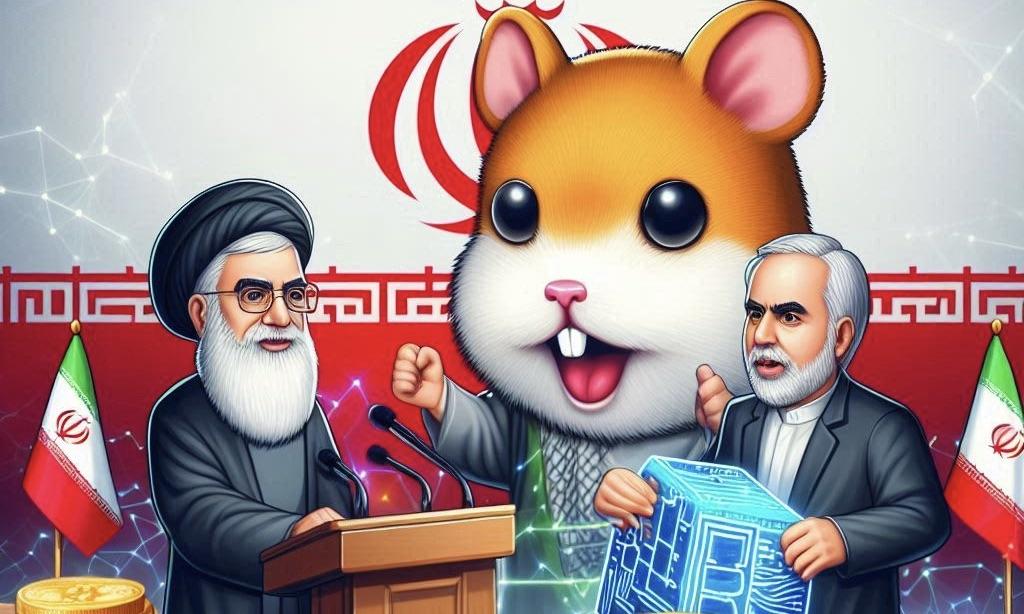Iranian officials have condemned the popular blockchain game "Hamster Kombat," alleging it distracts citizens from the upcoming presidential elections. Deputy Chief Habibollah Sayyari and religious leader Ayatollah Nasser Makarem Shirazi criticized the game as a Western soft power instrument.
Iranian Leaders Accuse 'Hamster Kombat' of Distracting Public from Upcoming Presidential Election
In a recent report by Cointelegraph, the deputy chief of the Iranian military asserted that the game was intended to divert Iranians' attention from the forthcoming presidential elections.
The Iranian government officials and hardliners have expressed their sharp criticism of the play-to-earn blockchain game "Hamster Kombat," which is gaining popularity. They have alleged that the basic play-to-earn tap game is a soft power instrument being projected by Western nations.
According to Habibollah Sayyari, the deputy chief of the Iranian military, the exercise's objective was to divert the Iranian populace's attention from the forthcoming elections. Ayatollah Nasser Makarem Shirazi, a religious authority, reiterated Sayyari's comments, characterizing the entire cryptocurrency industry as fraudulent.
Even though the country is currently experiencing skyrocketing inflation and Western sanctions, the dire financial situation in which many Iranians find themselves is not acknowledged in these comments from Iranian officials. The current exchange rate is 1 U.S. dollar to 580,000 Iranian rial, illuminating Iran's economic challenges.
Impoverished economic conditions have facilitated the emergence of blockchain games in developing countries. This novel phenomenon is illustrated by the NFT game Axie Infinity. At its peak, Axie users reported earning as much as $1,300 per month playing the game, a substantial source of income in developing countries.
Despite the relatively high entry fee for Axie, organized gaming guilds offered players in developing countries a means to mitigate the costs of playing the game and other blockchain games while still generating substantial profits for guild members.
Blockchain Games Gain Popularity in Developing Countries but Face Hurdles to Mainstream Adoption
Despite the increased traction of Web3 games in the developing world, blockchain gaming still needs to attain mainstream adoption.
According to a recent survey conducted by OnePoll, 52% of respondents were unaware of blockchain gaming, while 32% were aware of the concept but had never played one.
These figures indicate a substantial underserved market, but they also indicate more general issues with play-to-earn games, such as the absence of high-quality gameplay mechanics that can compete with those of console and PC games.
Photo: Microsoft Bing



 BTC Hovers Flat Near $68K Ahead of US-Iran Talks — Bulls Eye Break Above $70,050 for $78K Rocket
BTC Hovers Flat Near $68K Ahead of US-Iran Talks — Bulls Eye Break Above $70,050 for $78K Rocket  Bitcoin Crashes Below $65K: Bears in Full Control, Sell Rallies Now
Bitcoin Crashes Below $65K: Bears in Full Control, Sell Rallies Now  Pentagon Weighs Supply Chain Risk Designation for Anthropic Over Claude AI Use
Pentagon Weighs Supply Chain Risk Designation for Anthropic Over Claude AI Use  Hyundai Motor Plans Multibillion-Dollar Investment in Robotics, AI and Hydrogen in South Korea
Hyundai Motor Plans Multibillion-Dollar Investment in Robotics, AI and Hydrogen in South Korea  Nvidia Earnings Preview: AI Growth Outlook Remains Strong Beyond 2026
Nvidia Earnings Preview: AI Growth Outlook Remains Strong Beyond 2026  Synopsys Q2 Revenue Forecast Misses Expectations Amid China Export Curbs and AI Shift
Synopsys Q2 Revenue Forecast Misses Expectations Amid China Export Curbs and AI Shift  Meta Signs Multi-Billion Dollar AI Chip Deal With Google to Power Next-Gen AI Models
Meta Signs Multi-Billion Dollar AI Chip Deal With Google to Power Next-Gen AI Models  ETHUSD Weakens Further: $1,825 CMP, All EMAs Red, Sell Rallies @ $1,948–50
ETHUSD Weakens Further: $1,825 CMP, All EMAs Red, Sell Rallies @ $1,948–50  Ethereum Whales Just Loaded ~9 Million ETH — The Squeeze Is On
Ethereum Whales Just Loaded ~9 Million ETH — The Squeeze Is On  Anthropic Refuses Pentagon Request to Remove AI Safeguards Amid Defense Contract Dispute
Anthropic Refuses Pentagon Request to Remove AI Safeguards Amid Defense Contract Dispute  Trump Pushes Tech Giants to Build Power Plants to Offset AI Data Center Energy Costs
Trump Pushes Tech Giants to Build Power Plants to Offset AI Data Center Energy Costs  FxWirePro- Major Crypto levels and bias summary
FxWirePro- Major Crypto levels and bias summary  Alibaba, Baidu, BYD Shares Slide After Pentagon Military List Update
Alibaba, Baidu, BYD Shares Slide After Pentagon Military List Update 






























